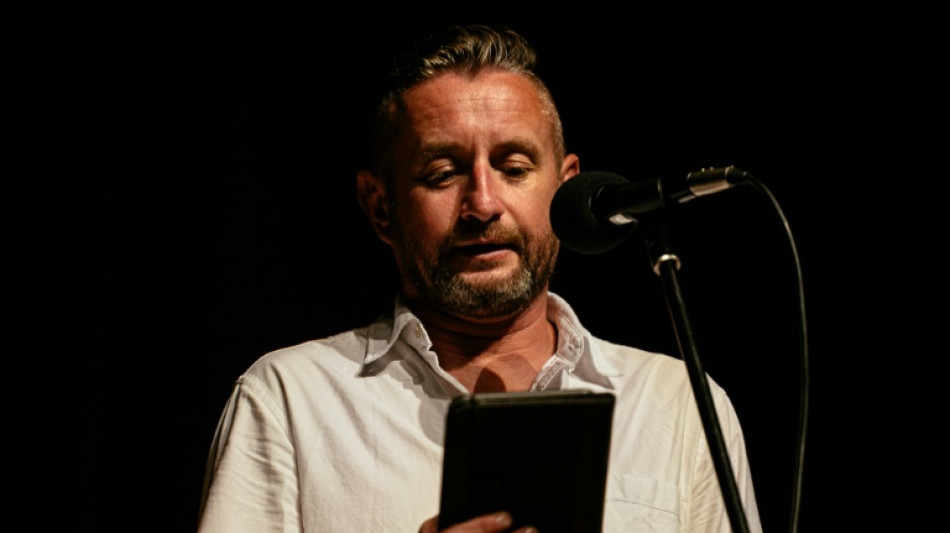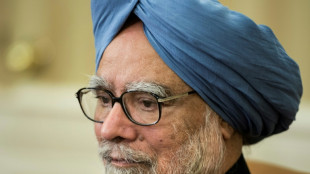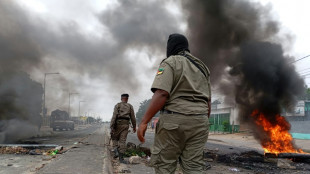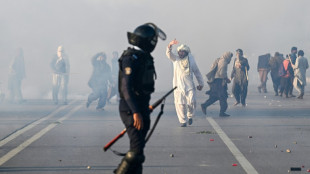

Ukraine's punk poet sees victory for 'transformed' homeland
Six months on from the start of the war, writer Serhiy Zhadan believes that Ukraine will win against Russia thanks to the courage and extraordinary mobilisation of its citizens.
Zhadan, a key figure in the Ukrainian literary world, is convinced that his country is emerging from the war a "transformed" country.
"I'm impressed by Ukrainian people's capacity to fight for their freedom, for their land, for their territory. This gives me strength and confidence," he told AFP in an interview, a few minutes before reciting his poems in a theatre in Kyiv.
With his piercing blue eyes and his blond slicked back hair shaved on the sides, the 48-year-old writer looks his part: a punk poet.
Serhiy Zhadan is an icon in Kharkiv, Ukraine's second biggest city. Originally from the now war-ravaged industrial region of Donbas in eastern Ukraine, he moved to Kharkiv to study in the 1990s.
In his novels, set in the Kharkiv region, he fondly speaks about life in neglected areas of post-Soviet Ukraine.
The region and its capital city have been heavily targeted since the beginning of the war -- 19 civilians were killed in strikes last week.
But despite Kharkiv coming under intense fire from Russian troops, Zhadan stayed there even when it seemed the city could be seized in March.
AFP journalists ran into him in April under the purple neon lights of a bunker-turned-shelter where he was reciting verses to bolster people's morale.
- Ukraine's 'conscience' -
Zhadan's poems, novels, music and translations have earned him praise accross the country.
But, six months ago, he traded his craft for more urgent matters: humanitarian aid and support for the Ukrainian army.
"I put it all on pause," he says.
As did his compatriots, he adds: "The citizens of this country have rallied to defend it."
Ukrainian civil society has mobilised on a massive scale since the beginning of the invasion.
Many have been helping refugees, assisting victims, or fundraising for the armed forces.
"Seeing how many people decided to join the fighting or volunteer made me realise the Ukrainian society's enormous potential. There's tremendous power here," the writer continues.
He is convinced that his country is "undergoing deep transformations".
In fact, Zhadan is performing in Kyiv to raise funds for two new vehicles for the Kharkiv armed forces. For two consecutive nights, The House of Cinema -- and its 670 seats -- is fully booked.
The audience fervently applauds when Zhadan appears on stage.
The short poems that he recites for an hour-and-a-half were written before the war, but they hit home.
Glimpses of Mariupol before it was destroyed, of life and love in the Donbas despite the fighting.
"Zhadan is our conscience... His poems talk about us, about who we are and what is happening around us," says Taras Katrychenko, a 34-year-old in the audience.
- 'Don't forget about Ukraine' -
Zhadan was also in Kharkiv during the Maidan movement in the winter of 2013-2014. Already famous at the time, he took an active part in the pro-European movement.
The takeover of the more eastern cities of Donetsk and Lugansk by Kremlin-supported forces had divided Kharkiv.
When pro-Russian demonstrations erupted in his city, Zhadan went to defend the local administration buildings. He was beaten up, his nose was broken.
This year, Russian troops took over his native city of Starobilsk, Lugansk region, early in the invasion. Zhadan was left with few illusions.
"I don't really like it when people say 'culture is a weapon', that's not accurate. A weapon is a weapon, and war is won with weapons," the writer says.
"Culture will come into play after the victory, for us to live our lives to the fullest."
Zhadan left his country a week ago to go on a fundraising tour in Europe. He has got a clear message for Europeans: "Don't forget about Ukraine."
"We will remind the world that the biggest military operation since the Second World War is taking place right now.
"And that during this operation people must clearly position themselves: either you support the aggressor, or you support Ukraine."
A.Uggeri--IM



